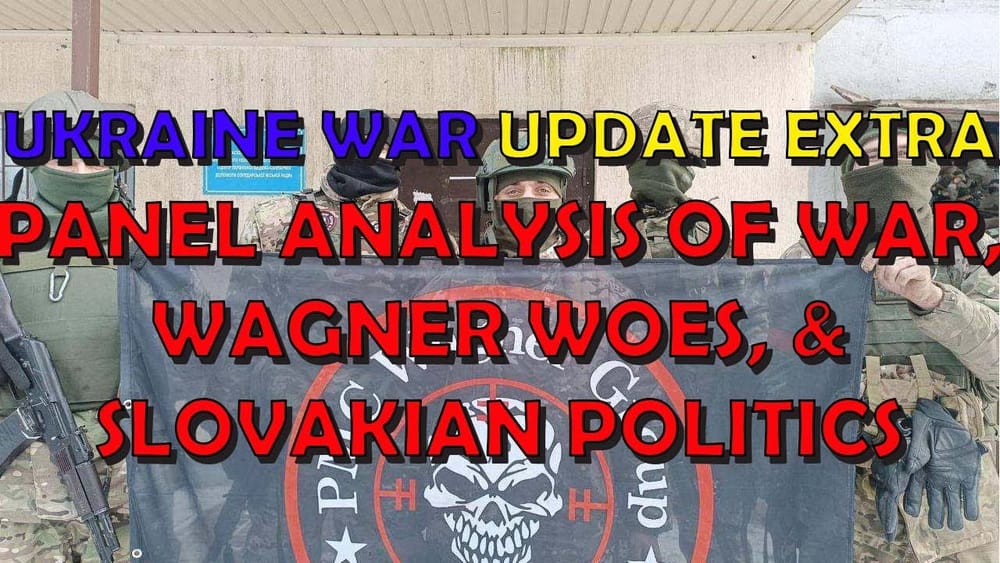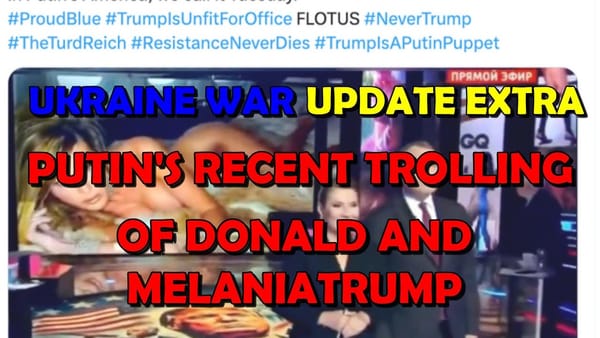Ukraine War EXTRA: Panel Discussion on War, Wagner Woes, & Slovakian Politics
🤖
This summary has been produced automatically by an AI Large Language Model (LLM) without any human intervention. Whilst every effort has been made to prompt the LLM to produce accurate output, there may be inconsistencies, inaccuracies or hallucinations!
Table of Contents 📖
| Topic ID | Topic Title | Timestamp |
|---|
"If in fact an aggressive bully can't simply invade a neighboring sovereign state for the purpose of destroying that state and removing it from the map and the state system. If that happens in one state, in the United States or Europe or the United Kingdom, actually stand by and watch, it can actually happen anywhere."
Hello Team!
Jonathan apologizes for mistakenly recording the wrong screen in a previous video. He is re-recording parts to fix the issue.
Return to top⤴️
Former Wagner Group fighters struggling to find employment
- Former Wagner Group fighters are finding it difficult to get jobs after the group's expulsion from the war in Ukraine, according to the Russian independent news outlet MO.
- Many are having to take low-paid jobs as taxi drivers, construction workers and doormen instead of jobs at defence companies, factories and the Russian National Guard.
- Relatives are complaining online that the fighters were promised a clean slate but the authorities have failed to fulfill their promises.
- Jonathan is not surprised by this outcome and believes it is due to empty promises from the Russian government. He notes the psychological harm and PTSD the fighters will face, putting strain on Russia's underfunded medical and psychiatric system.
Panel discussion highlights
Key points from a panel discussion on The Telegraph's Ukraine: The Latest podcast:
- The war is entering an industrial stage and attritional grind of who can stay in the fight the longest, according to Don Nichols.
- Kim Kagan from ISW believes the current slow-moving phase of the war is temporary. She expects Ukrainians to get close to a key Russian supply line to Crimea this winter.
- Hamish de Bretton-Gordon compares the situation to the Kosovo War, where progress seemed slow until a sudden breakthrough. He believes something similar could happen in Ukraine as Russian defences come under severe strain.
- The 2024 US elections are a concern internationally in terms of continued support for Ukraine, especially if Trump were to be re-elected.
- Mitt Romney strongly supports ongoing aid to Ukraine, calling it an "extraordinarily wise investment" of only 5% of the US defence budget to defend freedom and decimate the Russian military.
The importance of recognizing Russian war crimes
- Francis Dearnley from The Telegraph argues that while the West has learned about the severity of Russian war crimes in Ukraine, people are becoming numb to it and switching off from the terrible truth.
- He believes it is a shameful thing that needs to be addressed by politicians speaking more forcefully about what has happened.
- Kim Kagan emphasizes that the war crimes are not just individual acts of depravity but an organized and purposeful use of violence against civilians that constitutes genocide under international conventions.
- She notes that every day Russia occupies Ukrainian territory, people are experiencing the same horrors seen in Bucha and Mariupol.
- The West owes it to Ukrainians to recognize what Russia is doing because the stakes extend beyond Ukraine to the entire geopolitical order and whether aggressors can overturn it by force.
Slovakian politics and the war in Ukraine
- Slovakia has been one of Ukraine's staunchest supporters per capita, but that could change after upcoming elections according to a BBC radio documentary.
- Polls show a majority of Slovaks believe either the West or Ukraine are primarily responsible for the war, with only 40% blaming Russia - the lowest in the region.
- The opposition party Smer, which is leading in polls, wants to stop military aid to Ukraine. Its vice-chair Lubos Blaha frames the conflict as a proxy war and culture war, railing against "liberal mania" in the West on LGBT and gender issues.
- Jonathan criticizes this populist tactic of stoking anger over relatively minor social issues to excuse a lack of substantive policy and skew people's priorities.
- He warns that if Slovakia's election polls are accurate, the country could come under Russia's sphere of influence with negative consequences for Ukraine and European democracy.
Wrap up
Jonathan hopes the video was useful and thanks viewers for their incredible kindness and support. He signs off asking people to like, subscribe and share the video.
Return to top⤴️
🤖❓ AI Debrief (post task) - anything the AI didn't understand
There were a few instances where the transcript had some Welsh mixed in, which I ignored as it seemed to be a transcription error. Overall the transcript was clear.
🤖💭 AI Plan (pre task) - the AI's step by step thought process
Steps:
Watch the video and read through the transcript
Identify the main topics discussed in the video
Summarize each topic, providing enough context and detail
Include any sources, quotes, or opinions from Jonathan
Use British English spelling and grammar
Format the summary using the provided XML structure
Note any parts of the transcript that were unclear



